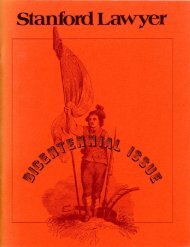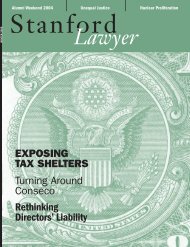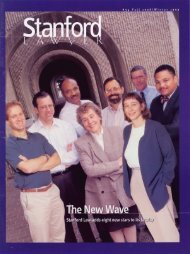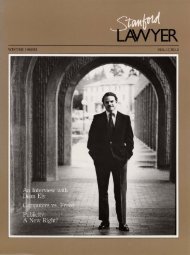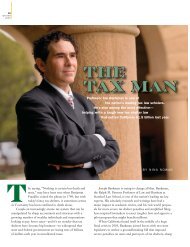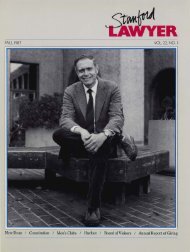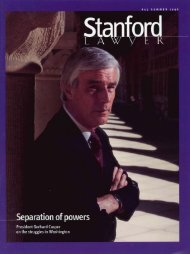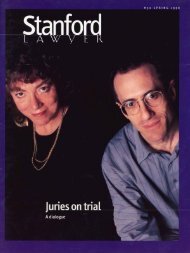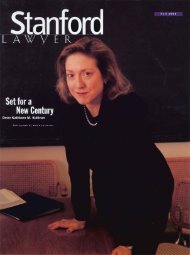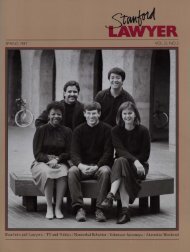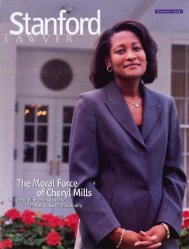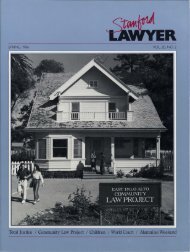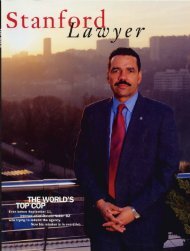Issue 73 - Stanford Lawyer - Stanford University
Issue 73 - Stanford Lawyer - Stanford University
Issue 73 - Stanford Lawyer - Stanford University
You also want an ePaper? Increase the reach of your titles
YUMPU automatically turns print PDFs into web optimized ePapers that Google loves.
NEW FACULTY<br />
29<br />
STANFORD<br />
LAWYER<br />
New Faculty and Promotions<br />
Legal Ethics Professor Norman Spaulding ’97<br />
Joins Law Faculty<br />
Growing up in Berkeley, California, Norman W. Spaulding ’97 couldn’t help feeling<br />
a deep appreciation for the power of law. His African-American father and<br />
his white mother were married within a year of Loving v. Virginia, the landmark<br />
1967 Supreme Court ruling that declared laws against interracial marriage unconstitutional.<br />
“It was incomprehensible to me, the idea that a state could have a law<br />
making it impossible for my mother and father to be married,” the 34-year-old scholar recalls now,<br />
shaking his head. “Since then, I’ve always had this sense of how deep law can reach into society. It can<br />
reach into the family. It can reach into the bedroom. It can reach into marriages.”<br />
Spaulding, a nationally recognized scholar in legal ethics and the history of the profession, won<br />
rave reviews at <strong>Stanford</strong> last year for his performance as a visiting professor from the <strong>University</strong> of<br />
California at Berkeley School of Law (Boalt Hall). Now he hopes to build on that success in his new<br />
position at <strong>Stanford</strong> as a tenured professor of law and John A. Wilson Distinguished Faculty Scholar.<br />
“I was quite happy at Berkeley,” he said in a recent interview, “but the students I had here were<br />
easily the best group I’ve ever had the pleasure of teaching.” <strong>Stanford</strong>’s stimulating intellectual climate<br />
was attractive as well: “If there’s one thing that really drove this decision home for me, it was the idea<br />
of getting to share work and grow as a scholar in this community.”<br />
As a <strong>Stanford</strong> law student in the mid-1990s, Spaulding served as an articles editor for the <strong>Stanford</strong><br />
Law Review, a member editor for the <strong>Stanford</strong> Environmental Law Journal, and a member of the Black<br />
Law Students Association. After graduation, he practiced in the San Francisco office of Skadden, Arps,<br />
Slate, Meagher & Flom LLP, where he did environmental litigation. Spaulding then clerked for Judge<br />
Betty Fletcher of the U.S. Court of Appeals for the Ninth Circuit and for Judge Thelton Henderson<br />
of the U.S. District Court for the Northern District of California, before joining the Boalt faculty<br />
in 2000. Last year, the Association of American Law Schools presented him with its Outstanding<br />
Scholarly Paper Prize for an article he wrote for the Columbia Law Review, “Constitution as Counter-<br />
Monument: Federalism, Reconstruction and the Problem of Collective Memory.”<br />
Barbara Allen Babcock, Judge John Crown Professor of Law, Emerita, remembers Spaulding as a<br />
standout in her criminal procedure course at <strong>Stanford</strong>. “His outstanding quality was and is intellectual<br />
eagerness and thoughtfulness,” she said. “He really loves the law and the study of law. That is what<br />
makes him a great teacher—his enthusiasm and passion are truly inimitable. It’s just a terrific hire.”<br />
Much of Spaulding’s scholarship focuses on when lawyers go wrong; he probes the causes of professional<br />
failure and malaise from a historical perspective. “We often hear the claim that the profession<br />
is in decline, that it’s in crisis because lawyers have become too zealous and too client-centered,” he<br />
said. “But that has never sat well with me.” In fact, “when you look back at the historical record, you<br />
find that most of the problems that we take to be indicia of a crisis in the legal profession are not new.<br />
American lawyers have always wrestled with the tension between serving clients, making a living, and<br />
serving the communities in which they work.” People will rightly be suspicious of lawyers and the<br />
power that they have in a society governed by law, he said. But at the same time, “they’ll want a zealous<br />
advocate when their rights are on the table.”<br />
At <strong>Stanford</strong>, Spaulding will teach courses in professional responsibility, civil procedure, and remedies.<br />
He plans to continue pro bono work (he’s representing a California prisoner) and is collaborating<br />
with Babcock to update her widely respected casebook, Civil Procedure: Cases and Problems. “You can’t<br />
imagine my surprise that I’m back here. But it’s wonderful and exciting, too. Everybody here does<br />
such exceptional work. It’s a real inspiration just to be in the building.”—Theresa Johnston<br />
PHOTOS: STEVE GLADFELTER; PHOTO OF CALDWELL BY JOE NETO; PHOTO OF HO BY BOB NAROD




